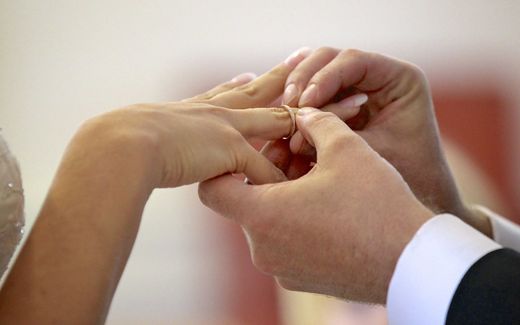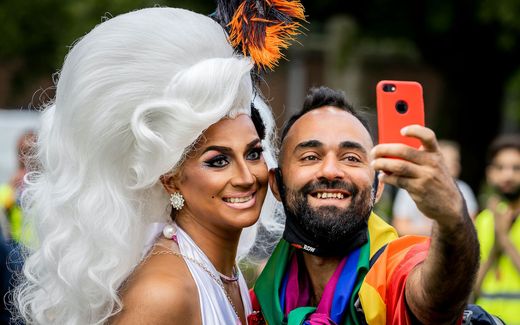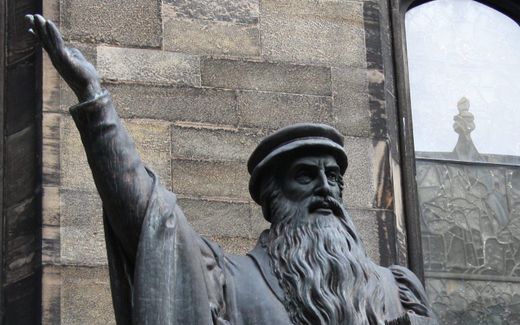Is polyamory the ultimate freedom?
22-10-2022
Opinion
Andreas Kinneging, RD

Photo iStock
Opinion
Polyamorous marriage, free access to abortion and modern parenting styles. At first glance, they do not have much in common. Yet, they are a manifestation of the struggle between two answers to the same question: whose will is decisive?
The Dutch Reformed Daily Reformatorisch Dagblad recently reported on a New York judge who ruled that "people in polygamous relationships should have the same legal protection as married people." The word polygamous is not entirely correct, as it refers to a marriage between one man and several women. The Reformatorisch Dagblad should have written: polyamorous because it refers to relationships between several people, regardless of gender. According to Judge Karen May Bacdayan, "the time has come" that love relationships between more than two people should be treated the same as the legally recognised relationship between two people. "What was normal in 1989 is no longer normative for our time," she said.
Before passing judgment on this, let us try to understand. Where do Judge Bacdayan's ideas come from? Why is it that she feels she has to draw this conclusion?
Freedom
It is because she, like most Western people today, has a modern view of right and wrong. What is good? The freedom to be able to do whatever one wants. What one does, how one arranges one's life, is entirely one's own business. Whatever one's own conception of what to do and how to live, one should not prevent anyone from organising his life as he sees fit, even if it is contrary to one's own preferences. For all lifestyles are equal in principle. Rules that privilege some lifestyles over others are objectionable. Social pressure -think of negative comments, laughter and so on - that pushes someone in a specific direction, is also wrong. Such rules and pressure are evil.
Now, most things we do in our lives we do not do by ourselves alone. We cooperate with others. From the modern perspective, how should humans cooperate? Based on the principle just mentioned: one should be free to do what one wants and, therefore, to cooperate with whom one wants. Since this freedom applies equally to everyone, cooperation, thus, occurs when two or more people want to work together. Not if one person wants it, but the other(s) do(es) not. Cooperation should not be enforced. It must be a free will decision, a free choice, of all concerned.
Based on these principles, what is marriage? A form of cooperation. It is good if and only if the people involved want it. Seen this way, there is no reason to restrict marriage to people of opposite sex. But neither to only two persons. From this point of view, there are no good reasons to be against a union of several persons, of whatever sex they may be. Just like there is nothing wrong with a temporary marriage of one night, a year, or a decade. If and only if all concerned consent to it, it is morally good. If the marriage is against the will of a person involved, it is forced and therefore evil. And if someone no longer wants an existing marriage, it is good to dissolve it.
Considering all of this, we need not be surprised that Judge Bacdayan has come out with the previously mentioned judgment. On the contrary, it was in line with expectations, as it is inherent in the modern way of thinking about right and wrong.
Whose will?
Why do Christians and other believers have so much trouble with this thinking? Because the Christian conception of right and wrong is of an entirely different, indeed opposite, nature. As we have just seen, in modern thinking the individual will serves as the supreme criterion for what to do and how to live. "What do I want?" counts as the most crucial question to ourselves, and "What do you want?" as the most important question to ask one another. For Christianity on the other hand -like all other world religions- it is precisely this individual will, that is the core of the problem. The Lord's Prayer says, "Thy will be done." Not mine. In other words, we are to obey God's will, not our own. Following one's own will is not a good thing, as in the modern view, but the root of all evil. It is equivalent to putting oneself on God's throne. Seen this way, acting well and living well does not result from doing what one wants oneself, but of doing what God wants. What He wills.
What is God's will? How can we know God's will? From two sources. The Holy Scriptures, on the one hand, and the order of creation, namely the world as it is knowable to man by reason, on the other.
Ideal
What do Scripture and the order of creation say about marriage? There has been no difference of opinion on this throughout the history of Christianity –or, for that matter, in the other world religions. This is significant because views diverge quite substantially on most other matters. God intends marriage as the lifelong union -cooperation- between one man and one woman. Its primary purpose is to have and raise children together. Only a man and a woman can do so together. The ideal is to enter marriage as a virgin, to remain married until the death of one of the spouses ends the marriage, and to have and raise children together -as many as possible.
This ideal is often not fully met by man. That is the brokenness of human existence, which is mainly due to man's own shortcomings. We have to accept that brokenness. It does not make our shortcomings a good thing. Nor does it detract from the ideal, if the ideal is often not fully realised.
In this view of marriage, a man's own will is obviously not the primary basis. The starting point is: "Thy will be done and not mine." from this perspective, the aim should be to conform one's own will to God's will. In other words, to subordinate one's own will to God's will.
Seen in this way, a marriage between two people of the same sex, or between more than two people, or a temporary marriage, and whatever else can be conjured up in this area, is an example of following one's own will, instead of God's and thus of putting oneself on God's throne. It is therefore an evil.
Suppression
What is the modern perspective on these Christian ideas? For a modern man, it is these ideas that are evil. For they do not leave man free to do as he pleases. They thus oppress him. And they make an unjustified distinction between different ways of life, all of which are equal in the eyes of modern man. One can see here that two views on humanity and the world are squarely incompatible and irreconcilably opposed.
And the contradiction by no means concerns only the definition of marriage. Whatever is the topic, prostitution, porn and drug use; abortion, euthanasia and suicide; upbringing and education; individual and family; education and entertainment; authority and power; democracy and theocracy; spirit and matter; heaven and earth, and so on; time and again, the two sides are equally incompatible and irreconcilable.
Contradiction
For a Christian, prostitution is evil because it separates the sexual act from the context that makes it good and sanctifies it: marriage. For modern man, "sex work" is no different from other work, provided all involved want it and freely consent to it.
For a Christian, abortion violates the commandment: "Thou shalt not kill." For a modern person, what is decisive is that the unborn child is unwanted. The main thing is free will and free choice. That the pregnant woman does not want the child is sufficient reason to abort it.
For a Christian, education is the formation of the child into a Christian. That is, into someone able and willing to conform his will to God's and thus put his own will second. This is not easy because with all of us -as children of Adam and Eve- following one's own will is, by nature, our strongest wish. This self-will needs to be broken. That means that parents very often have to prescribe precisely what the child does not want. To a modern person, this pedagogy is reprehensible. The child should have as much freedom as possible to be able to do what it wants. After all, childhood is the training school for adult life. And that life is about being able to do what one wants.
For a Christian, God's law is the supreme law. "One must obey God more than man." This means that human law, as drafted by parliament and government, is secondary. Human law is valid, provided it does not conflict with Divine law. Modern man does not recognise divine law. For him, only human law exists. Parliament and government are free to set the law as they please. One may believe in divine law, but one must always obey human law.
And so on.
Letting go
In the end, of course, what matters is which of the two sides is correct. Truth should be measure and rule in this, as in everything. Whoever is right should also be acknowledged as being right. However, the dispute is unlikely to be settled quite yet. In practice, it is therefore just as important to ask how these two parties, who are so opposed to each other, can nevertheless live together peacefully in this "earthly city".
There is only one way to achieve this: decentralisation of regulation and governance. Stop trying to impose and enforce one centrally determined line from above everywhere. Accept that different laws apply in different areas -municipalities, regions, provinces, states- and different communities. If, as an individual, one cannot accept the rules in the area where one lives and the community of which one is a part, then move to a place and join a community where rules apply that one can agree with.
The US Supreme Court chose this path in its recent ruling, Dobbs v Jackson Women's Health Organisation. Contrary to what is and has been suggested in the media, it did not "overturn the right to abortion" but merely determined that it is a matter for each of the 50 US states themselves. Through their own legislation, they should determine the extent to which abortion is allowed in their own state. That, it seems to me, is the only way to ensure peaceful co-existence, in a society where opinions on the subject of abortion are so divergent.
And abortion is not the only bone of contention between the two parties. As we just mentioned, there are many others, one of which is the definition of marriage. I, therefore, look forward with interest to what the Supreme Court will do in the coming years with the Obergefell v Hodges judgment of 2015, which declared marriage between two persons of the same sex to be a fundamental, constitutional right, applicable equally in all states. And I look forward to seeing what the Supreme Court will say about Ms Bacdayan's ruling, as it is bound to come before this high court, sooner or later.
Andreas Kinneging is professor in legal philosophy at the University of Leiden, The Netherlands
This article was translated by CNE.news and published by Dutch daily Reformatorisch Dagblad on October 19, 2022
Related Articles









